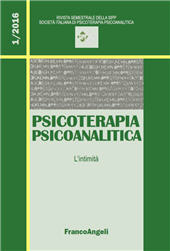Riflessioni sul termine beatitudine in Grotstein e in Bion
48-63 p.
L'esperienza di beatitudine rappresenta l'indizio che una mente sta nascendo nel bambino e nel paziente. Perché questa esperienza possa accadere, occorre l'incontro tra la capacità di rêverie della madre e la capacità di tollerare la frustrazione della crescita e della trasformazione, del bambino. Pur essendo la beatitudine come tutte le emozioni, effimera, produce conseguenze strutturali nel processo di soggettivazione come la ca-pacità di simbolizzazione, la creatività e la capacità di godere dell'arte. Se il contenitore-madre è stato capace di accogliere i terrori senza no-me del bambino, elementi beta, e attraverso la rêverie riproporglieli elaborati come elementi alfa, allora, nella reiterazione del processo, il bambino, non più spaventato, introietta la funzione alfa della madre che lo porterà a pensare da solo e per se stesso
Se questo incontro tra il contenitore materno e il contenuto che il bambino affida alla rêverie materna non avviene, il bambino privo di un contenitore è costretto ad affrontare una situazione di "senzeità", solo nell'abisso di un vuoto senza nome che deve essere difensivamente riempito. Nell'avidità, il desiderio difensivo che ha sostituito la costruzione di un apparato per pensare, si ritrova ad alimentare se stesso in una corsa all'accaparramento di cose che non può mai interrompersi. La madre-analista può offrire una possibilità di nascere al bambino-paziente se, con la sua rêverie e il suo sognare il sogno del paziente, può portarlo a sperimentare per la prima volta nella sua vita, l'esperienza delle emozioni. [Testo dell'editore]
The experience of bliss is the clue that a mind is being born, both in child and in a patient. For this experience to occur, the mother's capacity for rêverie and the child's capacity to tolerate the frustration of growth and transformation need to meet. Although bliss, like all emotions, is ephemeral, it produces structural consequences in the process of subjectivation such as the capacity for simbolization, creativity and the ability to enjoy Art. If the mother container is able to welcome the child's nameless terrors, beta elements, and through rêverie repropose them as alpha elements, then, in the reiteration of the process, the child, no longer frightened, will introject their mother's alpha function that will lead them to think on their own and for themselves
If this encounter between the maternal container and the content that the child entrusts to the mother's rêverie does not occur, the child, without a container will be forced to face a situation of "withoutness", alone in the abyss of a nameless void that they must defensively fill. In greed, the defensive desire which has replaced the construction of an apparatus for thinking, they will be forced to feed themselves in a neverending race to hoard things. The mother analyst can offer the child-patient a chance for their mind to be born if, by her own rêverie and by dreaming the patient's dream, she can lead them to experience emotions for the first time in their life. [Publisher's text]
is_part_of
Psicoterapia psicoanalitica : 2, 2024-
store_in_same_fr
-
information
doiCode: 10.3280/PSP2024-002004
issn: 2531-6753
KEYWORDS
- beatitudine, rêverie, contenitore-contenuto, legame -K.
- bliss, rêverie, container-content, -K bond


